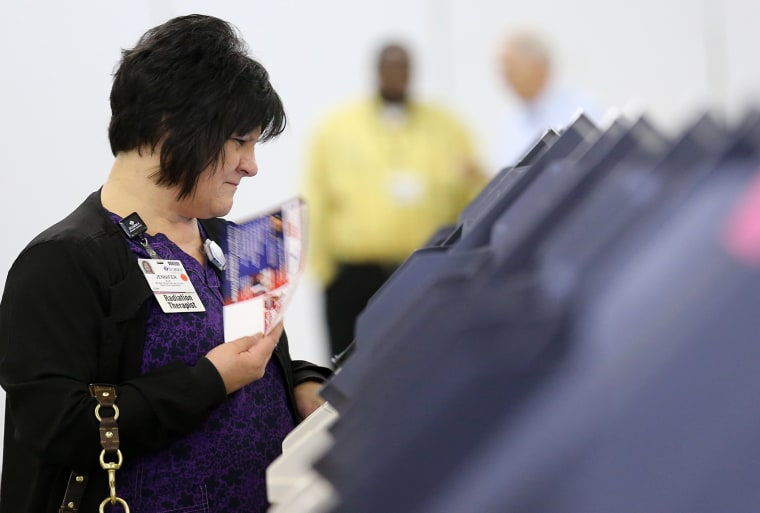Three separate court rulings issued Wednesday and Thursday to uphold voting restrictions are likely to increase the number of voters disenfranchised this fall.
In Ohio, likely the nation’s most important swing state, a federal judge on Wednesday upheld a controversial method for purging the voter rolls, which is likely to lead to eligible voters being removed. Around the same time, a federal judge based in Washington, D.C., approved — for now — a change to the federal voter registration form that will allow some red states to require proof of citizenship from people registering to vote. Then Thursday morning, Iowa’s Supreme Court ruled to maintain the state’s strict ban on voting by ex-felons.
The rapid-fire rulings come as concern mounts about access to the ballot in November. This will be the first presidential election in more than half a century without the full protections of the Voting Rights Act. Numerous states have new voting restrictions in place for the first time.
The Ohio decision could have the biggest impact this fall. U.S. District Judge George Smith, an appointee of President Ronald Reagan, green-lighted GOP Secretary of State Jon Husted’s practice of taking voters off the rolls if they haven’t voted in three straight federal elections, or any election in between. Mike Brickner, the executive director of the ACLU of Ohio, which brought the case, said his organization is considering whether to appeal.
Related: Iowa Upholds Felon Voting Ban
A Reuters investigation found that in the state’s three biggest counties, people in Democratic-leaning neighborhoods were struck from the rolls at roughly twice the rate as people in Republican-leaning neighborhoods. And it found that 144,000 voters in those counties were purged for infrequent voting or for moving.
“Nothing in Ohio statute authorizes targeting and removing voters from the rolls for not voting,” state Rep. Kathleen Clyde, a Democrat who has helped lead the effort against the purge, said in a statement. “This case isn’t over.”
In addition to its pivotal status in the presidential race, Ohio also hosts a close U.S. Senate contest that could determine control of the chamber.
Separately, U.S. District Judge Richard Leon, an appointee of President George W. Bush, declined to block a change made to the federal voter registration form by the director of the Election Assistance Commission (EAC), the federal agency that helps states run elections. In January, the director, Brian Newby, changed the form to require residents of for Kansas, Alabama, and Georgia to provide proof of citizenship when registering to vote. Voting rights groups sued, arguing that the change violates federal voting law, and that Newby overstepped his authority in making it.
Related: SCOTUS Unanimously Rejects Challenge to 'One Person, One Vote'
Newby’s move will make it far harder to conduct voter registration drives in Kansas, since few people carry proof of citizenship out with them in public — if they have it at all. It came after Newby was pressed by Kansas Secretary of State Kris Kobach, a prominent backer of strict voting and immigration laws. Newby was re-appointed to his previous job as local election administrator in Kansas by Kobach, and has publicly praised the secretary of state. There have been almost no cases of non-citizens voting in Kansas in recent years.
Leon’s ruling isn’t a final decision on the merits of the case, which will be heard before the election.
On Thursday, Iowa’s Supreme Court issued a 4-3 ruling that upholds the state’s ban on voting by former felons, unless the governor has personally restored their rights. That leaves Iowa as one of just three states — Kentucky and Florida are the others, though Kentucky is considering softening its rules — with a similarly strict ban.
The ACLU had argued that the state constitution’s ban on voting by people convicted of “infamous crimes” should be interpreted more narrowly to apply only to crimes that undermine the democratic process. The plaintiff in the case, Kelli Griffin, was a mother of four who voted in 2013 after an earlier drug-related conviction, wrongly believing her rights were restored. She was charged with illegal voting before being acquitted by a jury.
